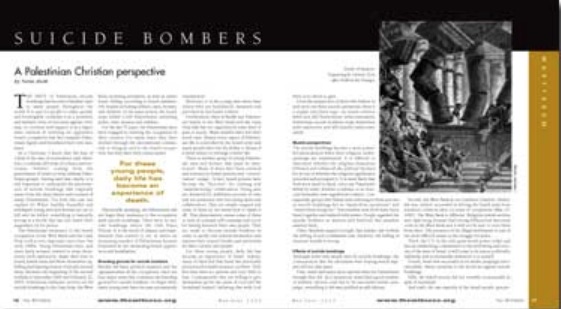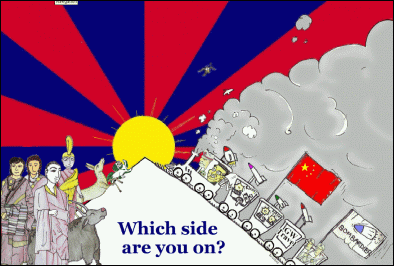The ultra-orthodox religionists (the Haredim/Charedim) of Israel now make up 10% of the population and are a critical support for the Olmert government.
For the Haredim the very existence of Israel cannot be justified without God and the Abrahamic promises in the Bible, which require the expulsion of the Palestinians from all that they believe God has given them. Haredi/Charedi prayers even call for the destruction of the secular state of Israel. Today these Haredim are a minority, “only” 10% of the population. But they make no secret of how they would enforce changes on Israel if ever they feel the muscle to do so.
They are the direct counterpart of Moslem extremists. Haredim claim to follow the Halachi [link downloads a 400 KB PDF file] rules as forever binding. The Halachi gives licence to kill secular Jews, to show no kindness to them. It also relegates women to being the property of their fathers and husbands, and forbids them to testify in legal proceedings. In another ironic twist in the minds no doubt for some western observers, some Jewish Haredi/Charedi women in Israel today are volunteering to wear the hijab. This is just one of their practices that actually demonstrates their claim to be reliving a past tradition that may never have existed: where there are doubts about interpretation of Halachi directives, they will err on the side of over-doing them.
Harmless nuts? A passing fad?
A Jewish site dedicated to “Enlightenment, education and freedom from religion”, Daat Emet, publishes online the reasons they believe non religious Jews and others should not dismiss the ultra-orthodox as harmless cranks.
There have always been religious extremists among orthodox Jews, and back in the 1960’s we were reading of sects who were apparently plotting the destruction of the Moslem Temple Mount in Jerusalem and the reinstitution of sacrifices. It appears that Jewish extremism is currently finding a growing support base within Israel itself.
Background Briefing (on Australia’s ABC Radio National) put together a well researched (though perhaps hastily edited) program on these ultra-orthodox Jews who are already having a serious impact on Israeli politics, not to mention the lives of other Jews and Arabs who come within their orbit. It is titled Israel: selling out secularism? From their site one can download the podcast of the program, listen to live-streaming, or read the transcript.
Background Briefing lists the following bibliography — of all readily accessible online articles — discussing more academically the background to the growth of the Haredi in Israel. I’ve read most of them, and recommend them to anyone wanting to seriously understand the social and psychological background to the rise of this social and political group today, and to explore some of the details of the fluctuations of their political strength over the past decade.
Iannaccone and Berman’s article (listed first) argues that safety lies in religious pluralism. Danger follows where States attempt to suppress certain militant religious movements. The United States is, perhaps paradoxically, held up as a model. Maybe so. The future is impossible to know. But thank the Enlightenment for the secularists, the educators, the peace activists in the meantime.
Title: ‘Religious Extremism, the good, the bad and the deadly’ in Public Choice 2006
Author: Laurence R. Iannaccone and Eli Berman
URL: http://econ.ucsd.edu/~elib/rex.pdf
Title: ‘Haredi Violence in Contemporary Israeli Society’ in Jew and Violence, Image, Ideologies, Realities
Author: Menachem Friedman
Publisher: Institute of Contemporary Jewry, Hebrew University of Jerusalem, 2002
URL: http://www.biu.ac.il/SOC/so/Haredi-Violence.pdf
Title: Sect, subsidy and Sacrifice: An economist’s view of ultra-orthodox Jews
Author: Eli Berman
Publisher: Quarterly Journal of Economics, 2000
URL: http://econ.ucsd.edu/~elib/sns.pdf
Title: ‘Rupture and Reconstruction: The transformation of Contemporary Orthodoxy’ in Tradition 1994
Author: Haym Soloveitchik
URL: http://www.lookstein.org/links/orthodoxy.htm
Title: ‘The Haredim and Israeli Society’ in Whither Israel – The Domestic Challenges
Author: Menachem Friedman
Publisher: The Royal Institute of International Affairs, 1993
URL: http://www.biu.ac.il/SOC/so/Ultra-Orthodox.pdf
Title: ‘The State of Israel as a theological dilemma’ in The Israeli State and Society, Boundaries and Frontiers
Author: Menachem Friedman
Publisher: State University of New York Press, 1989
URL: http://www.biu.ac.il/SOC/so/Theological-Dilemma.pdf
Title: ‘Haredim confront the modern city’ in Studies in Contemporary Jewry II
Author: Menachem Friedman
Publisher: Indiana University Press 1986
URL: http://www.biu.ac.il/SOC/so/Haredim-Modern_City.pdf
Like this:
Like Loading...




